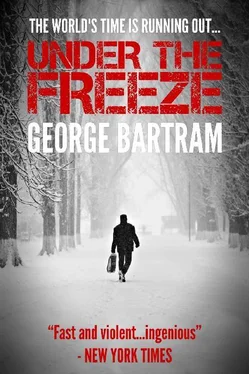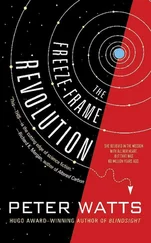“Ah, baksheesh,” he said.
“You got it, chum. How’s our story coming today?”
The payments started, it appeared, at the Ministry of News and Information, so back he went next morning to the same official who had issued his journalist’s card. His name was Kinsella, but he spoke only Spanish and was as Argentinian as the dry dust of Patagonia. He was a balding, slack-looking man in his thirties with a sandy mustache and the blue eyes of the Kinsella who had first come to Argentina in the nineteenth century.
Kinsella rested his head on one hand, absentmindedly pulling reddish hairs over the baldest place. He frowned at a piece of paper that lay in the circle of light on his desk. It was a dark day, and Tarp felt that he was receding into a Victorian murk, along with the city and its ideas.
Kinsella sighed. “You are requesting an interview with Juaquin Schneider.” He sounded more than a little surprised, as if such a thing had never happened to him before.
“That is correct.”
“You told me you were here because of the fishing. I remember mentioning Bariloche to you.”
“I believe it was I who mentioned Bariloche.”
“Why do you argue with me?” Kinsella looked annoyed. He put his face down into the circle of light as if he wanted Tarp to see its unhappy expression. “You are not a very tactful man.”
“Forgive me.”
“A journalist should be tactful. Especially if he has some idea of meeting a man like Juaquin Schneider.” He shook his head. “You said you were going to write about fishing.”
“Is that important?”
“Would I be mentioning it if it was not?”
“Is it your business to pass on everything I do?”
“Of course. What do you suppose my function is? This isn’t the United States, you know. We don’t want journalists running around like wild dogs, pestering people. You said you were here to write about fishing.”
“I said I was writing a book about diversions. I assume Señor Schneider has diversions.”
Kinsella put his hand over his forehead again and leaned on the elbow. “Señor Schneider’s office is not inclined to favor your request.”
“How do you know?”
“They called me twice yesterday. They said you were being a pest.”
“I thought I was going through channels. I did not realize that I should go through you.”
Kinsella looked at him. Kinsella already looked tired, as if his workday was ending, not beginning. “Señor Schneider is an immensely wealthy man.”
“That’s why I want to interview him.”
“We have to clear all interviews before you file them with your home office.”
“Well, all right.”
Kinsella watched him with an expression that suggested he had a secret that Tarp had not yet been told. “If I recommend you, Señor Schneider will see you.”
Tarp thought he understood. Chai . “I will be most happy to do whatever is necessary.”
Kinsella smiled a little cynically. “Would you like to have dinner with me?”
The request seemed odd. “I should be gratified.”
“At my home. I will telephone my wife. Tonight? Meanwhile, I will telephone the Schneider offices and recommend you. Then maybe he will see you.” He took his face out of the light. He seemed genuinely pleased. “We will talk. My wife is a good cook. You like children? I have three; I will have to play with them for a few minutes, you understand. Then we will talk.”
Tarp spent the day looking around Buenos Aires, poking through old files, and talking to his detective. All he learned was that he probably had the right Schneider.
Kinsella’s wife turned out to be fat but pretty; the children were well behaved and went docilely off to bed with the maid when they were told to; the food was excellent. After dinner the wife disappeared and they talked about the Malvinas war and Argentina’s future. Kinsella gave a virtual monologue on the failure of the United States to understand where its best interest lay in the region. Toward the end, the high cost of living was mentioned, and Tarp handed over three hundred dollars in Argentine pesos, the amount that Grice had suggested.
Walking back to his hotel, Tarp had the unpleasant sense that Kinsella knew who he really was. The talk about America had sounded like exactly the sort of thing a patriot might try to say to American leaders through an agent. Worse than that, neither Kinsella nor his wife seemed to be surprised when he ate no meat.
* * *
Schneider’s offices were deep within the administration building of his chemical complex, surrounded by carpeted corridors and paneled turnings where stunning receptionists and the young men with American degrees waited. Around them was a ring of glass-fronted offices, the outermost one manned by armed guards, while around them was a modern-looking wall of steel and stone with broken glass set into the top in such a way that it could be seen only from a few high vantage points. Outside that wall were young men in paramilitary uniforms with automatic weapons. Everyone was very polite.
He was given a badge to wear on his lapel and was asked to step through a metal detector, where a sweet-faced, dark woman asked him please to leave the Luger. She tagged it and gave him a receipt and a dazzling smile.
He was led by a sleek, middle-aged man along the inner labyrinth of carpeted corridors. As he had approached the center of power, the men had gotten older and the women had disappeared. Schneider, he gathered, was not the sort who surrounded himself with young nonentities in order to build his own sense of importance; rather, he pushed the young ones to the fringe and defied comparison with his own very capable lieutenants. It was the gesture of a confident (or an arrogant) man.
Tarp was shown into a long room whose starkness contrasted with the paneled warmth he had just come through. One entire wall was window from floor to ceiling; beyond it was an enclosed Japanese garden, forty feet long, with an identical window on the other side. Some trick of technology made the far window opaque. Within the room were groupings of chairs and very plain sofas, as if to accommodate discussions of different sizes. Tarp saw no ashtrays, no wastebaskets. Two-thirds of the way down the room was a white desk, situated so that the man who sat at it had his back to the window and the simplicity of the garden.
“Señor Jean-Louis Selous. A journalist.”
Light from the window made it hard to see the man at the desk. “Thank you, Perez.” The voice was deep. There was no sound of footsteps in the deep carpeting, but Tarp heard a door close, and the middle-aged man was gone. “Come,” the voice said.
He started down the long room. When he was fifteen feet from the desk, the silhouetted figure behind it moved. The torso moved back, turned; the figure came along the far side of the desk, still seated, the movement accompanied by a very low hum.
Schneider was in a motorized wheelchair.
Tarp saw the face as he rounded the end of the desk. He hid any surprise he felt. He had seen Schneider before — in Havana. He was the man who had been in the wheelchair at the ballet gala for the Celebration of Nuclear-Free Peace.
“What language do you prefer? I see you are French,” Schneider said. He had picked up a file from the desk.
“Either Spanish or French,” Tarp said.
“French, then.” Perhaps Schneider wanted to show off — or perhaps he wanted to test Tarp’s authenticity. Schneider spoke French with an accent but with considerable fluency. “I have read your articles with interest.” His hand was on the file. Presumably the file held the articles that Selous was supposed to have written.
“Was the viewpoint too Marxist?” Tarp said, speaking French rapidly and with the slight slurring that many French now affected. “Some people find it Marxist.”
Читать дальше












